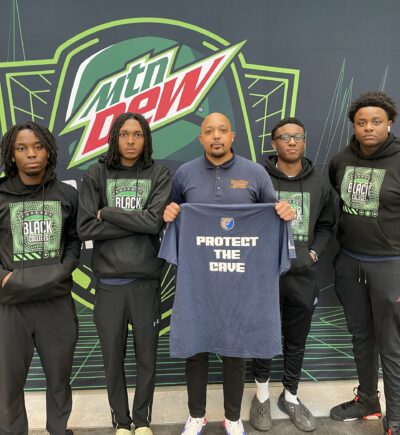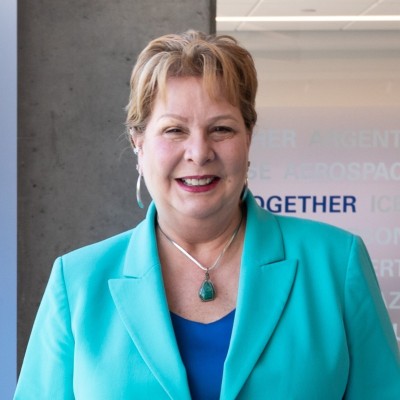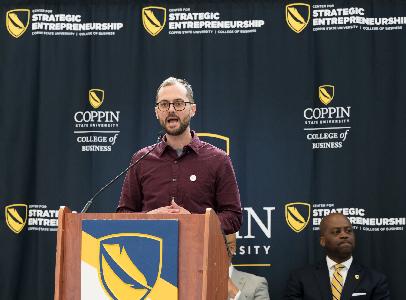Jess Gartner has sold her house, packed up her life and set out to road trip across the country to find a new home. Or maybe it’s more accurate to say the open road will be her home — wherever the Wi-Fi is.
For almost a decade, Gartner, the CEO and founder of edfintech company Allovue, has been making waves in Baltimore. In 2013, she left her job as the director of education at Federal Hill incubator Betamore and eventually grew her company into a 37-employee shop, along the way raising more than $13 million in capital, completing major acquisitions of fellow edtech startups, and becoming a thought leader on equitable company management.
Allovue, which provides tools to help K-12 school districts and state education departments budget, manage and evaluate spending, is no longer a Remington-based company, as Gartner pursues the digital nomad life. The company has clients and employees across the country, and along her journey to find the next place she wants to live, she’ll be visiting those connections in person.
With the rise of remote work, sleeping in a different town every night is not just a life reserved for musicians and Old West gunslingers. Tech professionals can do it, too.
But regardless of where Gartner goes next, Allovue will always be Baltimore founded. Thus, it’s not “goodbye, Baltimore” but “See you later” in this Exit Interview.
13 years. 4 homes. 3 jobs. 1 company. More friends than anyone deserves. See you soon, Baltimore. 💜🧡🖤
And now, we’re #OnTheRoad pic.twitter.com/asxgQlOZYq
— Jess Gartner (@jessgartner) July 31, 2022
Technical.ly: What inspired you to start the digital nomad life?
Jess Gartner: I was craving a big life change; I was restless. The last time I felt like that, I quit my job and started Allovue. I’m not looking to make that change again so I turned to other areas of my life.
I’ve lived in Baltimore for 13 years and I decided it was time to explore someplace new … but where? I travel a lot for work, but I usually don’t see much other than the airport and hotel room. There are many cities I’ve been eager to explore, but nowhere called to me quite enough to pick up and move there. I considered spending a quarter of a year in four different cities — but I was curious about way more than four cities, so then I came up with the idea of staying two to six weeks at a time in different places, and trying to visit 12 to 14 cities over the course of a year or so.
My rough plan is to do a slow clockwise loop around the country for the next year. I’m hoping to visit or camp in as many national parks as possible along the way, too.
What were the biggest hurdles to making the digital nomad transition?
Once I made the decision to do it, everything fell into place pretty quickly. I have the luxury of being single, child-free, and working remotely, so there was nothing stopping me from downsizing my life into a car and taking off with 60 days’ notice. Allovue has been remote-friendly since day one and 100% remote for over two years, so I can do my job anywhere with a good Wi-Fi connection.
I’ll certainly miss seeing my friends in Baltimore as often, but we’ve all had a lot of practice maintaining relationships virtually over the past couple of years. On the flip side, I’ll get to spend more time with friends and colleagues around the country. I’m sure there will be an adjustment period as we get on the road and start moving around, but the actual process of paring down and packing up has actually felt quite liberating.
Do you ever see yourself coming back to Baltimore?
For sure. My heart is forever tethered to Baltimore. This is really uncharacteristic of me, but I honestly have no end-game for this adventure. I am equally likely to come back to Baltimore after a while, resettle someplace new, or continue living nomadically. For someone who is normally a meticulous planner, it’s thrilling to have no concrete plan, for once. I might decide this was a terrible idea within a few months, I might fall in love with a new city, or I might want to keep exploring indefinitely.
What will you miss most about the Baltimore tech scene?
Baltimore entrepreneurs are consistently tackling problems with major social impact. Whether it’s healthcare, education, cybersecurity, Baltimore founders dream big. There’s hardly any fluff in Baltimore tech. My friend [Baltimore Corps President and CEO] Fagan Harris says, “Baltimore is the best place in the world to change the world,” and that really hits home when I think about the Baltimore entrepreneurial community.
I love the focus on equity in Baltimore tech, from Digital Harbor Foundation to Baltimore Tracks and UpSurge, Baltimore tech is building an ecosystem with an eye towards equity and inclusion. There’s a unique level of depth in what Baltimore companies are building as well as how they are building.
What are you looking for in the city and community where you want to put down roots?
More robust public transportation and pedestrian/bike infrastructure are high on my list. Ideally, I would be able to live somewhere without needing a car to get around efficiently. This is a big area for growth in Baltimore.
In the 10+ years I’ve lived here, I’ve been disappointed with how little progress has been made on these efforts as a city and state. The cancellation of the Red Line was devastating, but I haven’t observed big investments or attention from the City on this front, either, which is especially frustrating considering how many Baltimore residents do not have access to a car (about a third). It often requires multiple transfers and takes two the three times as long to get anywhere without a car. That’s a huge barrier for education, workforce development, and employment. I hope the new Maryland governor makes this a priority across the state, but especially in urban hubs like Baltimore City.
Beyond that, great local food, a vibrant arts and music scene, and plentiful green spaces are key criteria for me.
Donte Kirby is a 2020-2022 corps member for Report for America, an initiative of The Groundtruth Project that pairs young journalists with local newsrooms. This position is supported by the Robert W. Deutsch Foundation.Join the conversation!
Find news, events, jobs and people who share your interests on Technical.ly's open community Slack

This Black gaming advocate has a mission to transform education through esports

'Be bold': This digital innovation and business strategist urges fellow women leaders to be their authentic selves

Baltimore Power Moves: Open Works and Coppin State partner for a new makerspace, degree and tech transfer program


